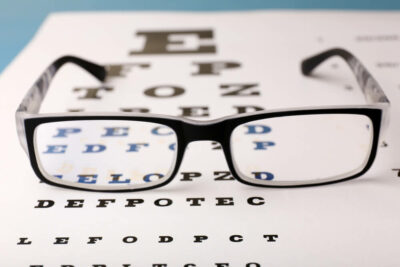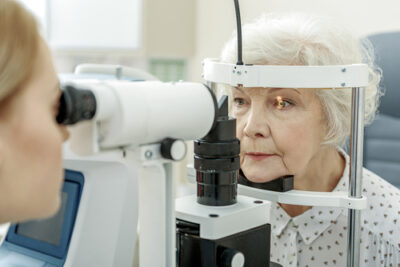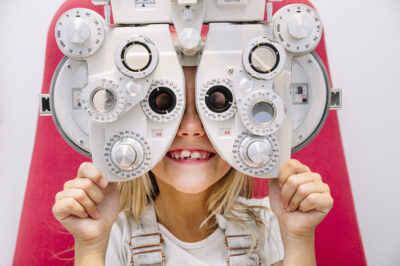Like brushing your teeth or seeing your primary care physician, getting an eye exam should be an annual part of your self-care routine. But for those that have always had good vision and never needed glasses or contacts, eye exams can seem kind of scary.
For many, the fear that comes out of something like an eye exam deals with the fear of the unknown. Keep reading for 7 of the most frequently asked questions about eye exams!
1. Will an eye exam be painful?

No, an eye exam should not be painful or cause you any pain. It’s natural to be nervous when you think about things touching your eyes!
After all, they are your only way of seeing the beautiful world around you. But eye exams will never cause you any pain.
2. What can I expect when I have an eye exam?
Let’s go through a few of the things you can expect when you have an eye exam:
Visual acuity

One of the most common ways of testing visual acuity is with the Snellen test. This test uses a chart of letters or symbols. It’s one of the most recognizable parts of an eye exam.
The chart has letters that are of different sizes. These letters are then arranged in rows and columns. You will then view the chart from 14 to 20 feet away with one eye covered.
With your eye still covered, you’ll be asked to read out the letters you can see with your uncovered eye and then you’ll repeat the process with the other eye.
Keratometry test
Another test that’s commonly done during an eye exam is a keratometry test. This test measures the shape and curve of the cornea.
This is important because the cornea’s shape affects how your eyes perceive and reflect light. Eye doctors use keratometry tests to detect if a patient has astigmatism.
During the test, you’ll gaze into a special machine that your eye doctor will adjust to align with your eye. They will then be able to read the machine’s measurements. These measurements show them what the shape of your cornea is.
3. How often do I need an eye exam?

There’s no one “right” answer to this question, as it varies. For the best eye health, an eye exam once a year is recommended. At the very least, you shouldn’t go for more than two years between eye exams.
How often you need eye exams will also increase if you have a family history of any eye diseases like glaucoma or age-related macular degeneration.
If you’re diabetic or in generally poor health, you should get more frequent eye exams as well. Even if you think your vision is “fine” eye exams can be one of the first diagnostic tools for other conditions.
An eye exam can be the first way of knowing that you have a brain tumor, an aneurysm, multiple sclerosis, or other serious conditions! As you get older, you will want to have more frequent eye exams as well.
Early diagnosis and treatment are crucial when it comes to conditions like glaucoma, cataracts, or macular degeneration. At the age of 60, you should have an eye exam every year to make sure your eyes are healthy.
4. When should my child have their first eye exam?

Children need to be able to see to be successful in school and life. For that reason, it’s important to get them on an eye exam schedule early.
The American Optometric Association recommends that children who are asymptomatic/low risk (no visible ocular problems) should have their first eye exam at 6 to 12 months of age. After that, they should have another eye exam at least once between the age of 3 and 5 years of age.
They should have their next eye exam before first grade and then have an eye exam every year through the age of 17 years of age. Starting early will teach your children that eye health is important and something that they should make a priority with the rest of their health.
5. What does it mean if someone has 20/20 vision?
It’s likely you’ve heard the phrase someone has 20/20 vision but you may not know what it actually means. 20/20 vision refers to visual acuity.
Visual acuity is how clear or sharp your vision is. If you have 20/20 vision, it means that you can see at 20 feet clearly what would normally be seen at that distance.
Most people do not have 20/20 vision because they have refractive errors due to an irregularly shaped cornea.
6. What is a dilated eye exam?
To fully see the back of the eye, your eye doctor will need to dilate your eyes. A dilated eye exam allows your eye doctor to see the entire retina, as well as the optic nerve. These are not visible unless the pupils are dilated.
The National Eye Institute recommends that starting at the age of 60, everyone should have an annual, comprehensive, dilated eye exam. During this eye exam, your eye doctor will look for any signs of glaucoma, macular degeneration, retinal tear, and other conditions.
The effects of a dilated eye exam can take anywhere between 4-6 hours to wear off. For this reason, if you have a dilated eye exam, you should not try to drive yourself home after.
You may experience light sensitivity as well as blurry vision. This occurs because the pupil is larger than normal, allowing more light to come through. Bring sunglasses with you if you’re concerned about sunlight being a problem after the exam.
7. How can I prepare before my next eye exam?

If you’re nervous about your next eye exam, it never hurts to prepare beforehand. Some things you can do include:
- Write down any vision problems you may be having that you can talk to your eye doctor about
- Jot down a list of questions you have or concerns that you want to discuss
- Bring your insurance card with you if you’re using your vision or medical insurance to pay for your appointment
- Bring any medications you take for your eyes or drops that you use over the counter to your appointment
Can’t remember the last time you saw your eye doctor for an eye exam? That’s usually a sign that it’s been too long!
Schedule one at Sugiki Portis Yim Eye Center in Honolulu, HI and make your eyes a priority this year!





